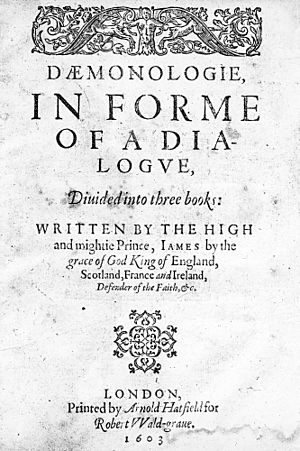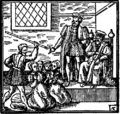Daemonologie facts for kids

Title page of a 1603 reprinting
|
|
| Author | King James VI of Scotland |
|---|---|
| Country | England |
| Language | Middle English, Scots, Irish |
| Series | 3 books and a news pamphlet in one volume. |
| Genre | Occult, Religion, Philosophy, Dissertation, Socratic dialogue |
|
Publication date
|
1597 |
| Media type | |
| Preceded by | Newes from Scotland (1591) |
Daemonologie is a famous book written by King James VI of Scotland in 1597. He later became King James I of England. The full title of the book is Daemonologie, In Forme of a Dialogue, Divided into three Books: By the High and Mighty Prince, James &c.
This book talks about how people in the Middle Ages thought about magic and spirits. It discusses ideas like necromancy (trying to talk to the dead) and black magic. It also mentions creatures like werewolves and vampires.
Many people believe that Daemonologie was one of the main books William Shakespeare used when he wrote his famous play, Macbeth.
Contents
Understanding Daemonologie
What is Daemonologie?
Daemonologie is a book about the study of demons and witchcraft. King James wrote it as a Socratic dialogue. This means it's written like a conversation between two people. One person asks questions, and the other answers them.
In this book, the two characters discuss many beliefs about magic. They talk about how witches might get their powers. They also discuss how to identify and deal with witches.
Why King James Wrote It
King James was very interested in witchcraft. He believed that witches were real and dangerous. He had even been involved in some witch trials in Scotland.
He wrote Daemonologie to explain his beliefs. He wanted to teach people about the dangers of witchcraft. He also wanted to show why witches should be punished. The book was meant to be a guide for judges and others. It helped them understand and prosecute suspected witches.
King James's Beliefs
King James believed that God allowed evil spirits to exist. He thought these spirits could harm people. He also believed that witches made deals with the Devil. This gave them special powers to do evil things.
His book explains how these deals might happen. It also describes the different types of magic. He wanted to make sure people understood the threat. He saw witchcraft as a serious crime against God and the king.
Impact on History and Culture
Daemonologie was very influential. It helped shape how people thought about witchcraft for many years. It was used by many people who hunted witches.
The book also influenced literature. As mentioned, it is thought to be a source for Shakespeare's Macbeth. The play features three witches who tell prophecies. These characters and their magic might have been inspired by King James's book.
Witch Trials
The ideas in Daemonologie were used during witch trials. Judges and accusers often referred to the book. It gave them reasons to believe in witchcraft. It also suggested ways to find and convict witches.
This led to many people being accused of witchcraft. Many of these trials happened in Scotland and England. The book played a part in the fear of witches during that time.
Images for kids
See also
 In Spanish: Daemonologie para niños
In Spanish: Daemonologie para niños
 | Sharif Bey |
 | Hale Woodruff |
 | Richmond Barthé |
 | Purvis Young |


